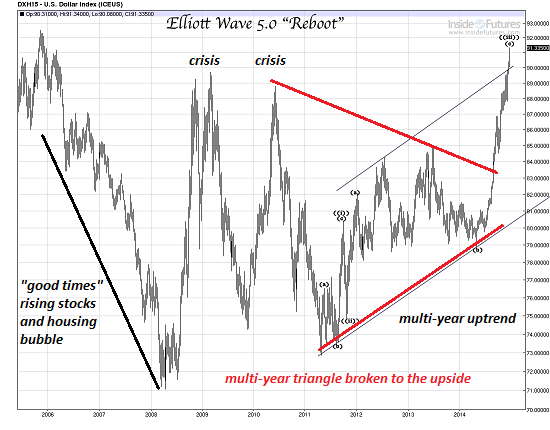
A Seven Amazing Charts From Black Monday
The damage in the markets created by the decline since last Thursday, particularly on Monday, is significant. We have noticed 7 amazing facts on Monday August 24th, which will go into history books as another ‘Black Monday.’
The volatility index VIX registered a 6-year high, spiking ‘out of the blue’ to levels not seens since the great crash of 2008 / 2009. See the two red circles in the first chart.

The Dow Jones literally crashed in 3 trading days, a decline not seen in many, many years. The days of the October lows of last year were ugly, but that is nothing compared to the last 3 days. The Dow Jones lost more than 2,000 points in those 3 days, a loss of 11.4% from high to low.

The heart of the matter is that Beijing has stepped on the gas in a quite complex long game; to liberalize the yuan exchange rate; allow it to free float against the US dollar; and establish the yuan as a global reserve currency.
 UN food agency describes conditions in war-torn nation as "perfect storm" as millions face massive food insecurity.13 million, adding that one in five of the country's population were suffering from severe food insecurity.
UN food agency describes conditions in war-torn nation as "perfect storm" as millions face massive food insecurity.13 million, adding that one in five of the country's population were suffering from severe food insecurity.
Entrenched poverty, months of intensified warfare and limits on imports because of an international embargo have contributed to "catastrophic" conditions
Why The Bear Of 2015 Is Different From The Bear Of 2008
Are there any conditions now that are actually better than those of 2008?
It's tempting to see similarities in last week's global stock market mini-crash and the monumental meltdown that almost took down the Global Financial System in 2008-2009. The dizzying drop invites comparison to the last Bear Market that took the S&P 500 from 1,565 in October 2007 to 667 on March 9, 2009.

But this Bear is beginning in circumstances quite different from 2007-08.
Let's list a few of the differences:
1. Then: Markets and central banks feared inflation, as WTIC oil had hit $133 per barrel in the summer of 2008.
Now: As oil tests the $40/barrel level, markets and central banks fear deflation.
2. Then: China had a relatively modest $7 trillion in total debt, considerably less than 100% of GDP.
now: China's debt has quadrupled from $7 trillion in 2007 to $28 trillion as of mid-2014, an astonishing 282% of gross domestic product (GDP)
3. Then: Central banks had a full toolbox of unprecedented monetary surprises to unleash on the market: TARP, TARF, BARF (OK, that one is made up) rescue packages and credit guarantees, quantitative easing (QE), zero interest rate policy (ZIRP) and direct purchases of mortgages, to name just the top few.
Now: The central bank toolbox is empty: every tool has already been deployed on an unprecedented scale. Every potential new program is simply a retread of QE, yield curve bending, asset purchases, etc.--the same old bag of tricks.

Learning Success:
APPLY Tips From The Best



